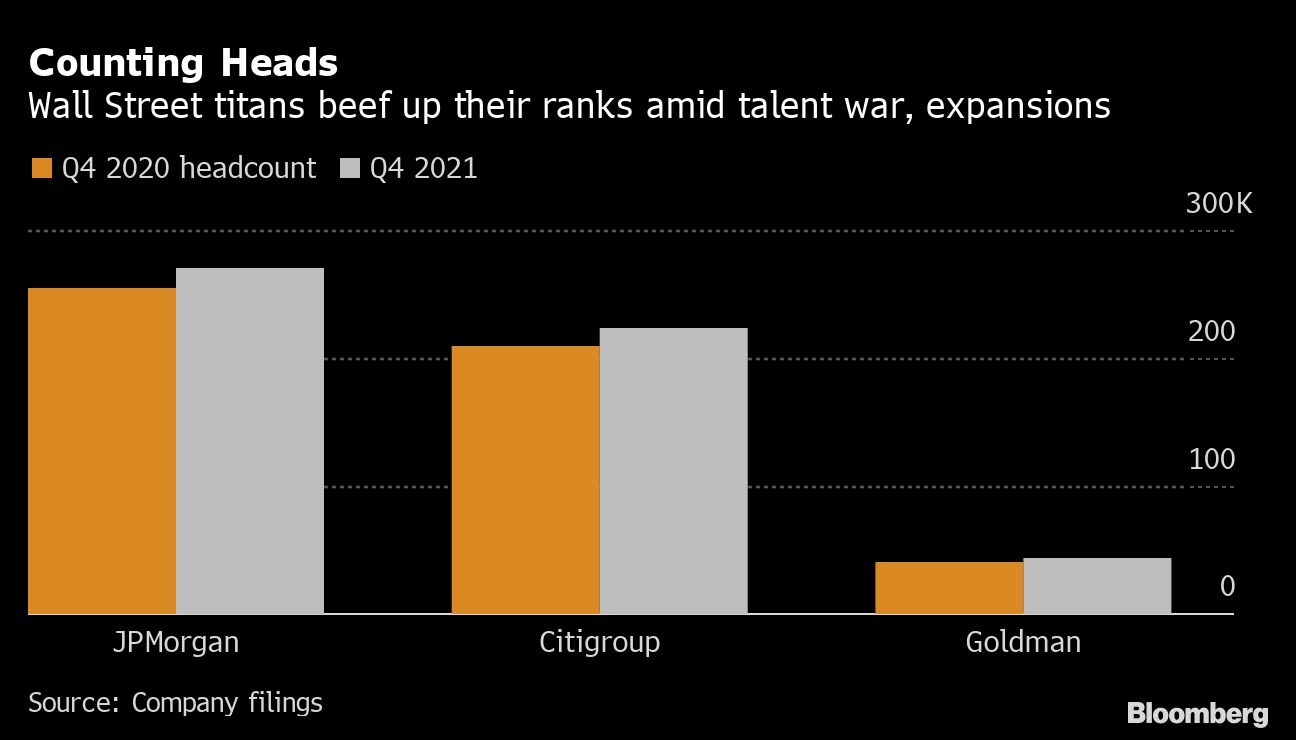Jan 18, 2022
Goldman's record expenses show ballooning costs of talent war
, Bloomberg News
Goldman Sachs shares sell off
In the escalating battle for Wall Street’s best and brightest, banks are paying up and share prices are taking a hit.
Goldman Sachs Group Inc. is the latest industry giant to report record-high annual expenses fueled by soaring compensation and benefits costs. The bank’s earnings report on Tuesday followed JPMorgan Chase & Co., which surprised the market last week with expenses at an all-time high and Chief Executive Officer Jamie Dimon vowing to pay whatever it takes to win the war for talent.
Wall Street bosses are shoring up their ranks, sweetening payouts and bolstering salaries at every level after the pandemic unleashed a trading and dealmaking boom -- adding to pressure driving up wages from soaring inflation and a tight labor market. They’re also fending off threats from expanding fintechs by making investments in new businesses and recruits with technology expertise.

Goldman Sachs is “committed to rewarding top talent” in a competitive labor environment, Chief Financial Officer Denis Coleman said during a call with analysts Tuesday. While the bank doesn’t expect operating expenses to rise materially from here, it will continue to spend on technology and engineering, he said.
The firm, which also reported steeper-than-expected trading revenue declines, said expenses soared 33 per cent to almost US$18 billion last year, with compensation and benefits the single biggest driver of the hike.
Without those costs, expenses would have dropped nine per cent, partly because of lower provisions for litigation and regulatory proceedings, the New York-based company said in a statement.
Shares of Goldman Sachs slumped 8.3 per cent to US$349.16 at 1:20 p.m. in New York, paring the gain over the past 12 months to 16 per cent.
JPMorgan also said it spent more in 2021 than it initially forecast because of higher compensation costs. The bank expects this year to be even more expensive, anticipating about US$77 billion of non-interest expenses. Some of that is due to the inflationary effects on wages -- a trend that helped drive the biggest share-price decline since 2020 on Friday.
Likewise, Wells Fargo & Co. Chief Financial Officer Mike Santomassimo said Friday that his bank was seeing above normal wage inflation as well.
Pay Pressure
Compensation and pay pressures emerged as a hot-button topic throughout last year. Bank bosses were forced to hike salaries for legions of burned-out junior bankers and reach for higher bonus payouts following restraint in 2020 to keep top performers happy.
Goldman is rewarding its partners -- roughly 400 executives -- with a special one-time award, Bloomberg reported last week. That payout will be in addition to their typical cash and bonus compensation, which ranges from a few million dollars to multiples of that after a year of record earnings.
The bank will likely to boost its bonus pool for investment banking by about 50 per cent while JPMorgan’s increases may extend to 40 per cent, Bloomberg reported last month.
The banks are also increasing headcount in a bid to stave off competition from an explosion in fintech firms. Goldman hiked staffing levels by eight per cent during 2021 as it added technology professionals and made new business investments, it said.
Citigroup Inc. hired 5,500 people for its technology arm and increased technology spending by 10 per cent from a year earlier to about US$10 billion, it said on Friday. The bank also increased salaries for U.S. junior investment bankers. First-year analysts will see their base pay rise to US$110,000 while second- and third-year analysts will get US$125,000.
“There’s a lot of competitive pressure out there on wages and pay,” Citigroup Chief Financial Officer Mark Mason said.



